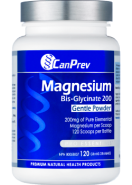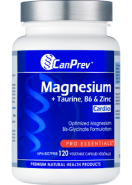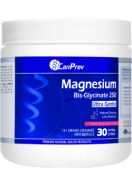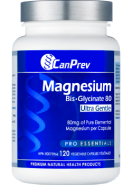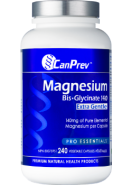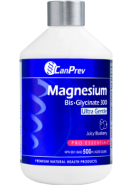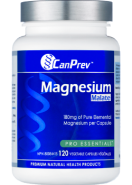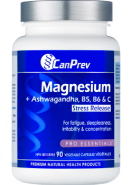Alive! Calcium Plus Vitamin D3 Gummies - 60 Gummies - Nature's Way
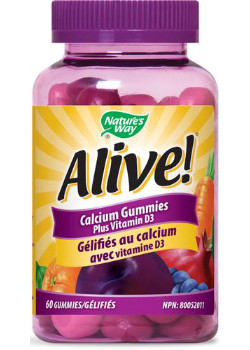
We're sorry, we no longer carry this item.
Check These out
Suggested, Similar, & Related Products:
Or, Shop our Latest Deals:
Shop Now >- 250 mg
- Calcium (Calcium phosphate tribasic)
- 115 mg
- Phosphorus (Calcium phosphate tribasic)
- 12.5 mcg
- Vitamin D3 (cholecalciferol (500IU)
tapioca syrup, cane sugar, pectin, fruit and vegetable blend (orange, blueberry, carrot, pomegranate, prune, strawberry, pear, apple, beet, raspberry, cherry, pineapple, pumpkin, cauliflower, grape, açaí, asparagus, banana, broccoli, brussels sprout, cabbage, cranberry, cucumber, pea, spinach, tomato), citric acid, colour (black carrot juice concentrate), cherry flavour, strawberry flavour, fractionated coconut oil, beeswax, silica.
Format
 Gummies
Gummies
60 Gummies
Dosage
Adults take 2 gummies per day. Take a few hours before or after taking other medications.
Important Information
Keep out of reach of children. Store at room temperature. This product does not contain gelatin, gluten, dairy, yeast, wheat, peanuts, or eggs. No artificial flavours or preservatives,
- Great tasting fruit flavours
- Helps support bone and muscle health
- Made with fruits and vegetables
- Provides 250mg of calcium and 500 IU of Vitamin D3
- Helps the body metabolize carbohydrates, fats and protein
Related Videos
No Related VideosArticles by a naturopathic doctor.
For over 40 years, Nature’s Way has built a reputation for quality and trust. Nature's Way is committed to using pure ingredients, backed by rigorous testing, which has earned them a reputation as one of Canada’s most trusted natural product brands. Shop Nature's Way Canada Fenugreek, Probiotics, Astragalus, Liquid Coconut Oil, Echinacea and other natural herbal remedies.
What is calcium and what does it do? Calcium is an important mineral for the optimal functioning of many body systems, and a building block in our bones and teeth. Calcium also protects the body from heavy metal toxicity by competing for absorption against lead. Calcium ions are involved, at the cellular level, with the folding structure of the RNA and DNA molecules and the activation of enzymes for the metabolism of fats. Our nerves also use calcium for the proper transmission of impulses, and our muscles use calcium to contract and relax.
In addition, calcium lowers cholesterol, by inhibiting plaque formation, and lowers blood pressure, by ensuring the proper functioning of the arterial muscles. This mineral is commonly recommended by natural health care practitioners for osteoporosis, osteoarthritis, cardiovascular disease, PMS, pregnancy, optimal cell growth, nervous disorders, muscle cramps and insomnia.
Deficiency
Deficiency of calcium can occur because of insufficient dietary intake or because of increased loss caused by negative conditions within the body. The standard North American diet is high in protein, fat, sugar and phosphorus from the consumption of meats, refined grains, junk foods, salty foods, alcohol, coffee and soft drinks. Not only is this diet low in calcium, it also leads to a disruption of the acid/base balance with a shift towards acidity, and the body is forced to buffer using calcium. The calcium drawn out of the bones to be used as a buffer in the bloodstream is then lost in the urine. This can also be caused by some medications, or when the body is in a state of inflammation, like with inflammatory conditions such as rheumatoid arthritis or lupus. If calcium is deficient, toxic lead is absorbed by the body and deposited in the teeth and bones. The muscles in the body use calcium for contraction and deficiency can result in painful muscle spasms. Similarly, the heart uses calcium in its contractions, so deficiency can lead to arrhythmias. Deficiency of calcium also causes bone and joint diseases such as osteomalacia, osteoporosis and osteo-arthritis. It also leads to poor growth and poor bone density in children (Rickets).
TYPES OF CALCIUM
There are different ways that calcium can be delivered to the body. Many products that contain calcium have less absorbable forms, such as calcium carbonate. Chelated or citrated calcium supplements are easier for the body to use and can be taken with or without food. Chelated simply means that calcium is bonded to a protein molecule, for example aspartate or glycinate, and citrated means that calcium is bonded to a citrate molecule. Both processes enhance calcium's absorption in the intestinal tract. At the same time the greater size of the resulting molecules decreases the amount of calcium per dose unit when compared with simple calcium carbonate. The types of calcium commonly found for supplementation are as follows:
Calcium Carbonate
Calcium carbonate is not the best calcium source because it must be taken with food for absorption, and its basic nature may interfere with proper digestion, which requires acidity from stomach acid. Additionally, up to 40% of people over the age of sixty have chronic stomach inflammation that prevents the breakdown of calcium carbonate.
Coral Calcium
Coral calcium is a naturally occurring calcium found in complex with magnesium oxide in a 4:1 ratio (calcium:magnesium) as well as many other minerals. Two types of coral calcium exist, fossilized and marine. Fossilized coral is farmed after it floats to the top of the ocean while marine grade is live coral that is vacuumed from the ocean floor. There is a debate between the makers of both types as to which is better with no clear winner emerging. One must consider the ecological effect of both processes when purchasing coral calcium. Ensure that your supplement is tested for contaminants since the coral is farmed from the ocean. Even after purification coral calcium contains minute amounts of heavy metals and should not be consumed by pregnant or nursing women.
Microcrystalline Hydroxyapatite Compound (MCHC)
MCHC is sourced from animal bones (usually cow or sheep), and contains a significant amount of calcium, along with other minerals required for proper bone formation. Some practitioners believe that this is an optimal calcium form because it contains all of the other substances that naturally occur in the bone. Like most animal-derived products, it is important to ensure the quality of the supplement and the conditions under which the animals have been raised. To minimize the chance of contamination with heavy metals or disease agents like the prions that cause "Mad Cow disease" (BSE), choose supplements from countries such as New Zealand.
D1-calcium-phosphate
D1-clacium-phosphate is used in some low-end supplements and should be avoided. This form of calcium actually inhibits the absorption of other minerals in a mineral complex and is insoluble. The calcium in antacids, when taken a therapeutic amount, neutralizes stomach acid. They are not recommended as a calcium source because without stomach acid, the calcium cannot be absorbed.
How do I take calcium?
Calcium supplements are best taken in small doses throughout the day because the body can only absorb 500mg at one time, no matter how large an amount each dose contains. However, if you are using calcium for its relaxation properties it is beneficial to take a larger dose before bed, especially when combined with magnesium.
Co-Supplementation
Lysine is an amino acid that is needed for calcium absorption. It can be taken in supplemental form or through the use of foods such as cheese, eggs, fish, lima beans, milk, soy products and brewer's yeast. Calcium absorption is also increased by combination with magnesium and vitamin D. In general, the ratio recommended is 2:1, calcium: Magnesium with an associated dose of Vitamin D (this dose varies widely from 100 1000IU).
- Reviews
- POST A NEW REVIEW
















